语法复习7:倒装句 16开
- 格式:doc
- 大小:46.00 KB
- 文档页数:6
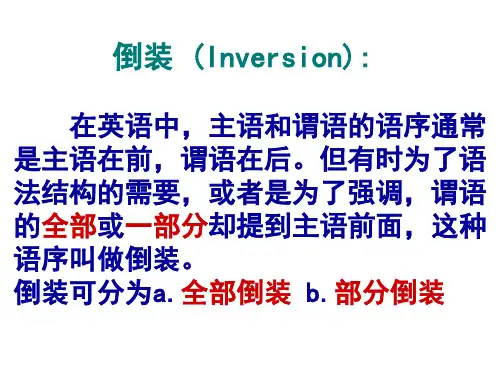
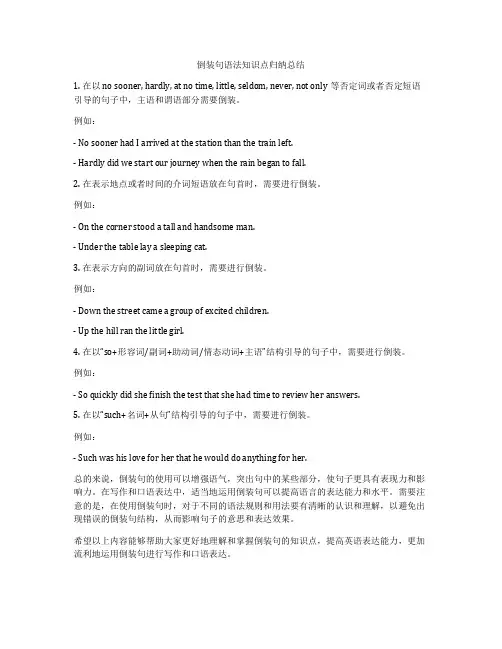
倒装句语法知识点归纳总结1. 在以no sooner, hardly, at no time, little, seldom, never, not only等否定词或者否定短语引导的句子中,主语和谓语部分需要倒装。
例如:- No sooner had I arrived at the station than the train left.- Hardly did we start our journey when the rain began to fall.2. 在表示地点或者时间的介词短语放在句首时,需要进行倒装。
例如:- On the corner stood a tall and handsome man.- Under the table lay a sleeping cat.3. 在表示方向的副词放在句首时,需要进行倒装。
例如:- Down the street came a group of excited children.- Up the hill ran the little girl.4. 在以“so+形容词/副词+助动词/情态动词+主语”结构引导的句子中,需要进行倒装。
例如:- So quickly did she finish the test that she had time to review her answers.5. 在以“such+名词+从句”结构引导的句子中,需要进行倒装。
例如:- Such was his love for her that he would do anything for her.总的来说,倒装句的使用可以增强语气,突出句中的某些部分,使句子更具有表现力和影响力。
在写作和口语表达中,适当地运用倒装句可以提高语言的表达能力和水平。
需要注意的是,在使用倒装句时,对于不同的语法规则和用法要有清晰的认识和理解,以避免出现错误的倒装句结构,从而影响句子的意思和表达效果。
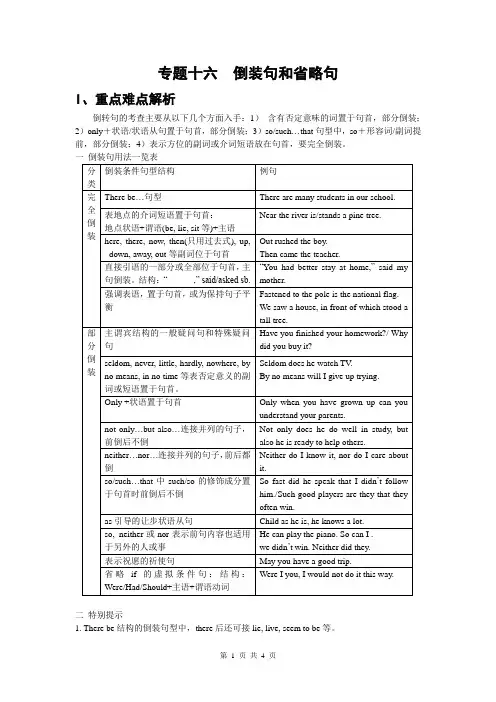
专题十六倒装句和省略句I、重点难点解析倒转句的考查主要从以下几个方面入手:1)含有否定意味的词置于句首,部分倒装;2)only+状语/状语从句置于句首,部分倒装;3)so/such…that句型中,so+形容词/副词提前,部分倒装;4)表示方位的副词或介词短语放在句首,要完全倒装。
二特别提示1. There be结构的倒装句型中,there后还可接lie, live, seem to be等。
例如:There lived an old man in the village long long ago.2. here, there, now, then(只用过去式), up, down, away, out等副词位于句首,主语为代词时不倒装。
例如:Out he rushed.3. 直接引语的一部分或全部位于句首,主句倒装。
但是主语为代词时不倒装。
“You had better stay at home,” she said.4. So位于句首不倒装的情况:主语与前句相同,表赞同, 译为“确实如此”。
例句:---Mike studies hard.---So he does. (确实是。
) 比较: (---So do I .我也是。
)5. 表示前句内容也适用于另外的人或事,前句如果列举了两种事实以上,用“So it is/waswith sb/sth.”回答。
---Tom is kind and often helps those in trouble.---So it is with his father.省略句高考命题导向:省略是一种避免重复,保持简洁的语法手段。
缺少一个或一个以上的必要语言成分,但在一定语境中能够独立存在,意义明确,并且能发挥交际功能的句子叫做省略句。
高考主要是考查省略在固定结构中的运用。
省略句用法一览表II、实战演练根据括号中的提示完成句子。
1.Not until __________________ (I; shout) at the top of my voice ________________ (he; turn) his head.2.I won the prize at last. Never in my life ___________________ (I; feel) so happy.3.Hardly _____________________ (the thief; see) the police ___________ he ran away.4.---Hurry up! There _______________________ ( the bell; go).---My goodness! Has Mrs Li come yet?---Look! Here ___________________ (he; come)5.Not only ___________________ (he; like) singing, but __________________ (he; have)a good voice.6.---David has passed the final exam smoothly.---So _________________ (he; have), and ___________________ (I, have).7.So ____________________ (he; be frightened) in the darkness that he did not dare to move an inch.8.Up _________________________ (the balloon; go) into the air.9.At the foot of the mountain _________________________ (a village; lie)10.I’v tried very hard to improve my English. But by no means _______________________ (the teacher, be satisfied) with my progress.11.If Joe’s wife doesn’t go to the party, neither ______________________.(他也不去)12.Should _________________________ (如果明天下雨), we would have to put off the sports meet.13.Child __________________ (尽管只是孩子), he shows great consideration towards the others.14.---Mike hadn’t passed the exam and was afraid of being scolded.--- ________________________. (我也一样)15.________________________________ (我们一听到铃声) than we rushed into the classroom.16.---He hasn’t finished the work yet.---Well, he _________________.(本该完成)17.The man we followed suddenly stopped and looked as if _______________ (see) whether he was going in the right direction.18.---Is your mother a teacher?---No, but she __________________.(过去是)19.---Do you know Anna’s telephone number?--- _______________ .(恐怕不知) As a matter of fact, I don’t know any Anna, either.20.---Who should be responsible for the accident?---The boss, not the workers. They just carried out the order ____________ (按被告诉的).答案:1. I shouted; did he turn 2. have I felt 3. had the thief seen; when 4. goes the bell; he comes 5. does he; he has 6. he has; so have I 7. frightened was he8.went the balloon 9. lies a village 10. is the teacher satisfied 11. will he 12. it rain tomorrow 13. as/though he is 14. So it was with me. 15. No sooner had we heard the ring 16. should/ought to have 17. to see 18. used to be 19. I’m afraid not 20. as told。
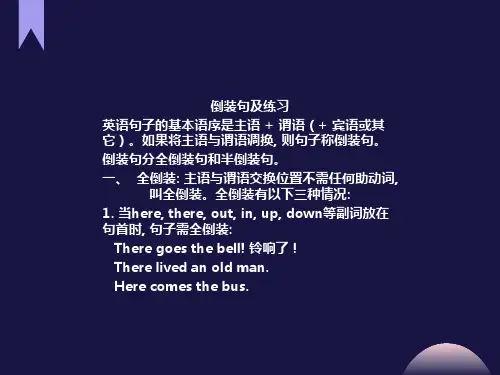
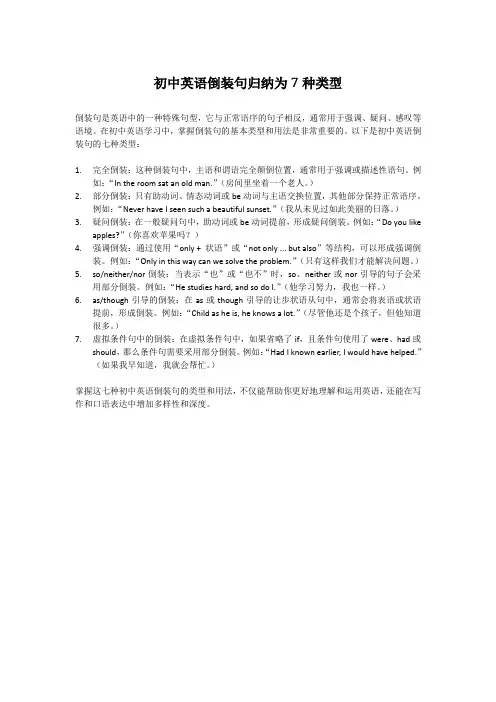
初中英语倒装句归纳为7种类型倒装句是英语中的一种特殊句型,它与正常语序的句子相反,通常用于强调、疑问、感叹等语境。
在初中英语学习中,掌握倒装句的基本类型和用法是非常重要的。
以下是初中英语倒装句的七种类型:1.完全倒装:这种倒装句中,主语和谓语完全颠倒位置,通常用于强调或描述性语句。
例如:“In the room sat an old man.”(房间里坐着一个老人。
)2.部分倒装:只有助动词、情态动词或be动词与主语交换位置,其他部分保持正常语序。
例如:“Never have I seen such a beautiful sunset.”(我从未见过如此美丽的日落。
)3.疑问倒装:在一般疑问句中,助动词或be动词提前,形成疑问倒装。
例如:“Do you likeapples?”(你喜欢苹果吗?)4.强调倒装:通过使用“only + 状语”或“not only ... but also”等结构,可以形成强调倒装。
例如:“Only in this way can we solve the problem.”(只有这样我们才能解决问题。
)5.so/neither/nor倒装:当表示“也”或“也不”时,so、neither或nor引导的句子会采用部分倒装。
例如:“He studies hard, and so do I.”(他学习努力,我也一样。
)6.as/though引导的倒装:在as或though引导的让步状语从句中,通常会将表语或状语提前,形成倒装。
例如:“Child as he is, he knows a lot.”(尽管他还是个孩子,但他知道很多。
)7.虚拟条件句中的倒装:在虚拟条件句中,如果省略了if,且条件句使用了were、had或should,那么条件句需要采用部分倒装。
例如:“Had I known earlier, I would have helped.”(如果我早知道,我就会帮忙。
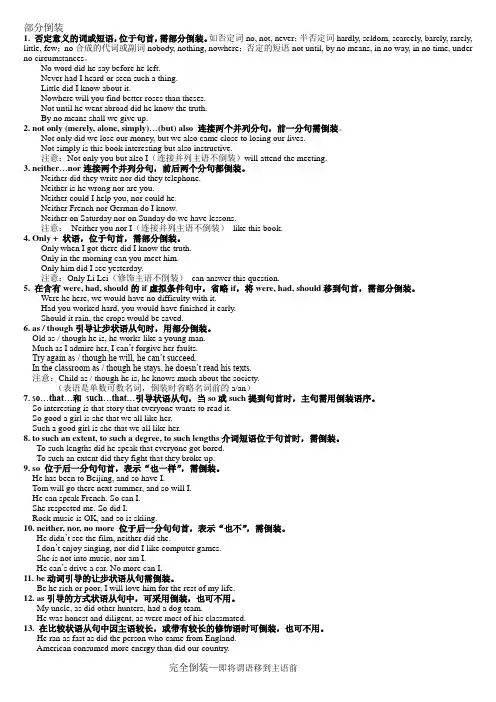
部分倒装1. 否定意义的词或短语,位于句首,需部分倒装。
如否定词no, not, never;半否定词hardly, seldom, scarcely, barely, rarely, little, few;no合成的代词或副词nobody, nothing, nowhere;否定的短语not until, by no means, in no way, in no time, under no circumstances。
No word did he say before he left.Never had I heard or seen such a thing.Little did I know about it.Nowhere will you find better roses than theses.Not until he went abroad did he know the truth.By no means shall we give up.2. not only (merely, alone, simply)…(but) also 连接两个并列分句,前一分句需倒装。
Not only did we lose our money, but we also came close to losing our lives.Not simply is this book interesting but also instructive.注意:Not only you but also I(连接并列主语不倒装)will attend the meeting.3. neither…nor连接两个并列分句,前后两个分句都倒装。
Neither did they write nor did they telephone.Neither is he wrong nor are you.Neither could I help you, nor could he.Neither French nor German do I know.Neither on Saturday nor on Sunday do we have lessons.注意:Neither you nor I(连接并列主语不倒装)like this book.4. Only + 状语,位于句首,需部分倒装。
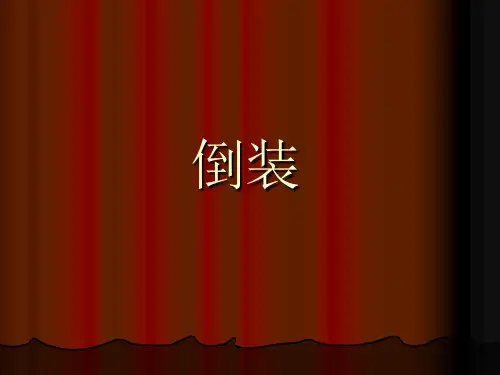
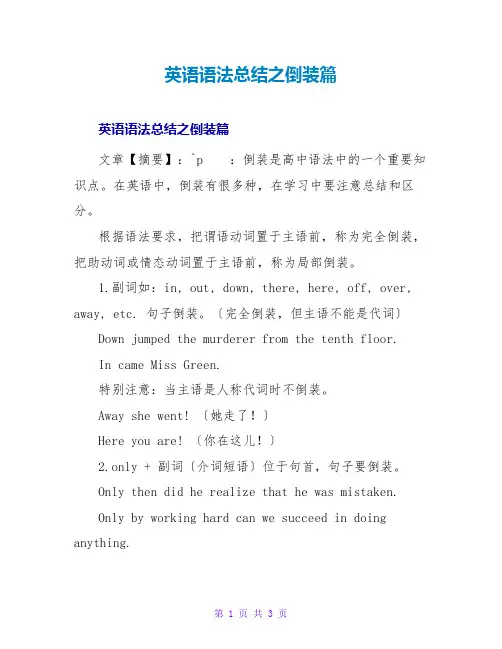
英语语法总结之倒装篇英语语法总结之倒装篇文章【摘要】:^p :倒装是高中语法中的一个重要知识点。
在英语中,倒装有很多种,在学习中要注意总结和区分。
根据语法要求,把谓语动词置于主语前,称为完全倒装,把助动词或情态动词置于主语前,称为局部倒装。
1.副词如:in, out, down, there, here, off, over, away, etc. 句子倒装。
〔完全倒装,但主语不能是代词〕Down jumped the murderer from the tenth floor.In came Miss Green.特别注意:当主语是人称代词时不倒装。
Away she went! 〔她走了!〕Here you are! 〔你在这儿!〕2.only + 副词〔介词短语〕位于句首,句子要倒装。
Only then did he realize that he was mistaken.Only by working hard can we succeed in doing anything.3.well, so, often, such, few, little 放于句首,句子形成倒装。
So fine was the weather that we all went out lying in the sun.Well did I know him and well did he know me.4.否认词或具有否认意义的词及词组用在句首时,句子须倒装。
此类词有: neither,nor,hardly,scarcely,rarely,seldom,not,never,not only,barely,at no time,nowhere等。
——Jack could not swim.——Neither could Tom.Never have I seen such a good movie.5.as引导让步状语从句,须倒装。
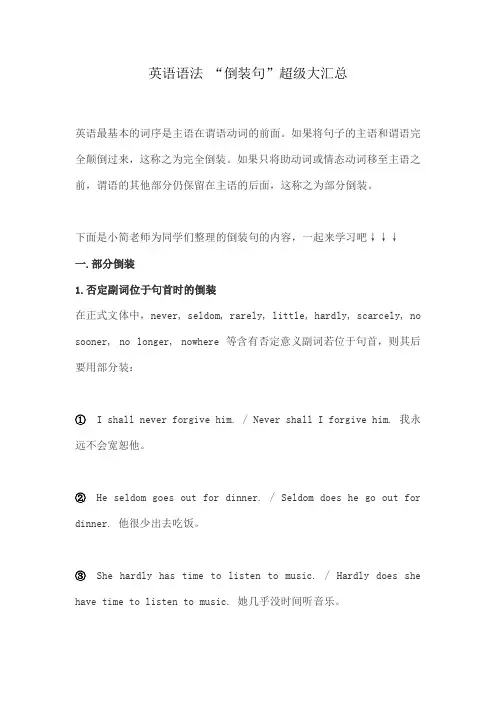
英语语法“倒装句”超级大汇总英语最基本的词序是主语在谓语动词的前面。
如果将句子的主语和谓语完全颠倒过来,这称之为完全倒装。
如果只将助动词或情态动词移至主语之前,谓语的其他部分仍保留在主语的后面,这称之为部分倒装。
下面是小简老师为同学们整理的倒装句的内容,一起来学习吧↓↓↓一.部分倒装1.否定副词位于句首时的倒装在正式文体中,never, seldom, rarely, little, hardly, scarcely, no sooner, no longer, nowhere 等含有否定意义副词若位于句首,则其后要用部分装:①I shall never forgive him. / Never shall I forgive him. 我永远不会宽恕他。
②He seldom goes out for dinner. / Seldom does he go out for dinner. 他很少出去吃饭。
③She hardly has time to listen to music. / Hardly does she have time to listen to music. 她几乎没时间听音乐。
④He little realizes how important this meeting is. / Little does he realize how important this meeting is. 他不甚明白这个会议的重要性。
⑤We had no sooner reached the airport than the plane took off. / No sooner had we reached the airport than the plane took off. 我们刚到机场,飞机就起飞了。
注意(1) 对于not…until句型,当not until…位于句首时,其后的主句要用倒装语序:He didn’t leave the room until the rain stopped. / Not until the rain stopped did he leave the room. 雨停了之后他才离开这房间。

43 语法复习七:倒装句 英语最基本的语序是主语在前,谓语动词在后。但有时由于句子结构的需要或表示强调,就要采用倒装形式。将谓语动词完全移到主语之前称为完全倒装,只将助动词或情态动词放到主语之前称为部分倒装。强调性倒装和以so, neither, nor开头的句子是高考例题的热点。 (一)倒装句的意义 1、适应一定的语法结构的需要,主要是指疑问句句型结构的需要。 e.g. May I come in? Was the People’s Liberation Army founded in 1927? 2、为了强调某一部分,而把这部分放到句首,构成倒装。 e.g. Never have I been late for school this term. So early did he come to school that no other students came. (二)倒装的使用情况 1、在 “there be” 结构里,there是引导词,主语在be后。 e.g. There is a box on the table. 2、在疑问句中。 e.g. Is she singing in the classroom? What does your mother do? 3、在here, there等副词开头的某些句子里(要用一般现在时态)。如果主语是人称代词,主语和主要动词的词序不变。(完全倒装) e.g. There goes the bell. Here is an apple for you. There she comes. 4、重复倒装句型,用在以so, nor, neither开头,表示谓语所述的情况也适用于另一个人或一事物的肯定或否定句中。so用于肯定句,表示“也一样”、“也这样”;nor, neither用于否定句,表示“同样也不,也不这样”。 e.g. I am watching TV. So is she. My parents didn’t watch TV last night. Neither (Nor) did I. 5、直接引语的全部或一部分放在句首时,主句中的主谓也常直接倒装。(完全倒装) e.g. “Very well,” said the French student. “Bring me two eggs and a cup of tea, please.” said he. 6、在以never, little, hardly, not only, few, not, seldom等否定副词开头的句子中,采用部分倒装。如不放在句首就不要倒装。 e.g. Little did he say at the meeting. Never shall I forget the day when I joined the Army. 比较:I shall never forget the day when I joined the Army. 7、用于以only所修饰的副词、介词短语或状语从句的句子中。 e.g. Only when the war was over in 1918 was he able to get happily back to wrk. Only in this way can we learn English well. 44
注意:如果only后的词组不是状语,不需倒装。 e.g. Only Wang Lili knows this. 8、为了表达生动,有时把表地点、方位的副词,如 up, down, out, away, in等放在句首,同时把谓语动词放在主语之前。若主语为人称代词,主语和谓语动词的位置不变,只将副词放在句首。(完全倒装) e.g. Away hurried the boy. Out rushed the girl. 9、在虚拟结构中,条件从句的谓语含有were, had 和should这三个词是,可省去if,将这些词移至主语之前。 e.g. Had I time (= If I had time), I would go and help you. Were I you (= If I were you), I would go abroad. Should he come (=If he should come), tell him to ring me up. 10、as引导让步状语从句时要倒装(形容词/ 副词/ 名词/ 动词 + as + 主语 + 谓语)。 e.g. Proud as they are, they are afraid to see me. Child as he is, he seems to know everything.(child前不加冠词) Hard as he worded, he made little progress. 11、用于某些表示祝愿的句子里。 e.g. May you succeed! Long live the People’s Republic of China! 12、So + 形容词、副词及such 置于句首时要倒装。 So happy did he feel. Such was me.
练习:倒装句 1. Not until I began to work ____ how much time I had wasted. A. didn’t I realize B. did I realize C. I didn’t realize D. I realized 2. Only by practising a few hours every day ____ be able to master the language. A. you can B. can you C. you will D. will you 3. If you don’t go, neither ____. A. shall I B. do I C. I do D. I shall 4. No sooner ____ to the station ____ the train left. A. had I got, when B. I had got, than C. had I got, than D. did I get, when 5. ---- Your father is very strict with you. ---- ____. He never lets off a single mistake of ours A. So he is B. So is he C. He is so D. So does he 6. ____ today, he would get there by Sunday. A. Would he leave B. Was he leaving C. Were he to leave D. If he leave 7. Never in my life ____ such a thing. A. I have heard or have seen 45
B. have I heard or seen C. I have heard or seen D. did I hear or see 8. ---- Here ____! Where is Xiao Liu? ---- There ____. A. comes the bus, is he B. comes the bus, he is C. the bus comes, is he D. the bus comes, he is 9. ____ , I will not buy it. A. Much as do I like it B. As much I like it C. Much as I like it D. As I like it much 10. ---- I like football. I don’t like volleyball. ---- ____. A. So do I B. Neither do I C. So it is with me D. So is it with me 11._____ the expense, I _____ to Italy. A. If it were not, go B. Were it not for, would go C. Weren't it for, will go D. If it hadn t been, would have gone 12. So _____ in the darkness that he didn' t dare to move an inch. A. he was frightened B. was he frightened C. frightened he was D. frightened was he 13.—In modem times, girls like beautiful clothes. —Yes, _____ and boys. After all, our life has greatly improved. A. so do they; so do you B. so they do; so you do C. so do they; so you do D. so they do; so do you 14.—You have an English class every day except Sunday. --- _____. A. So we have B. So we do C. So have we D. So do we 15.1 wonder if your wife will go to the ball. If your wife _____, so _____ mine. A. does; will B.will; does C.will; would D.does; do 16. Only after I read the text over again _____ its main idea. A. that I knew B.did I knew C. 1 could know D. I did know 17.—You seem to have learned all the English words by heart. A.Sol do B.Sodol C. So I have D. So have 1 18. —I seldom watch TV, but listen to the radio a lot. A. So do I B. Neither do I C. I m the same D. So it is with me 19. So excited _____ that he couldn't say a word. A. he seemed B. did he seem C. was he seeming D. he did look 20. Jimmy was so nervous not a single word _____ down in the dictation.